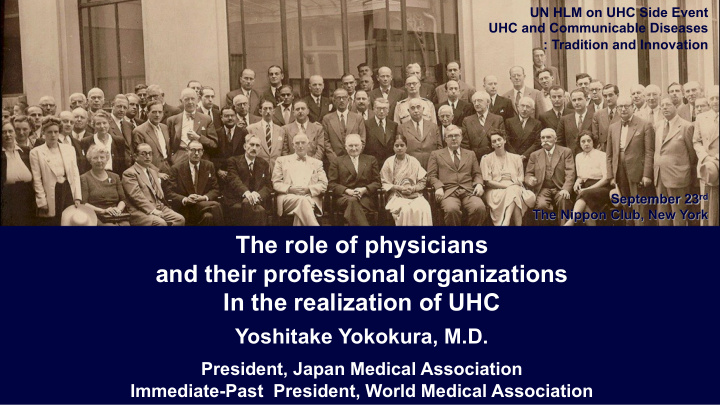



UN HLM on UHC Side Event UHC and Communicable Diseases : Tradition and Innovation September 23 rd The Nippon Club, New York The role of physicians and their professional organizations In the realization of UHC Yoshitake Yokokura, M.D. President, Japan Medical Association Immediate-Past President, World Medical Association
Universal Health Coverage Forum 2017 Tokyo, Japan, December 13-14, 2017 Declaration of Support by Global Health Leaders 1
MOU between WMA and WHO on UHC and Emergency Disaster Preparedness Geneva, Switzerland, April 5, 2018 a) The realization of UHC for All, with special focus on the role of physicians and their professional organizations. b) Strengthening education, employment and management of health workers. c) Promoting actively health-related human rights and to ensuring the full respect of medical ethics. d) Strengthening and developing systems of emergency and disaster preparedness. 2
Health Professional Meeting (H20) 2019 - Road to Universal Health Coverage - June 13 th & 14 th , 2019, Hilton Tokyo Odaiba, Tokyo Her Imperial Highness Crown Princess Akishino Minister of Health, Labour Prime Minister Abe Minister of Finance Aso 3 and Welfare Nemoto
Keynote Speeches If we want to achieve not just healthcare coverage, but better health for our populations, we need to be taking action on the Sir Michael Marmot: social determinants of health. Health Inequities and SDH I believe that participation of medical associations in various fields such as education and nutrition, and their advocacy and support of activities placing a high value on human health will be of Dr. Naoko Yamamoto: 4 great help in changing society. Towards UHC-What we need?
Session 1: How to achieve UHC? Dr. Osahon Enabullele The session reaffirmed the need to strengthen existing commitments of governments, non governmental bodies/ non state actors (including the World Medical Association, National Medical Associations, and other Health professionals) to UHC. 5
Session 2: Health Security and UHC Disasters and disease epidemics are major threats to the on-going efforts to achieve UHC. Controlling health threats can be a contributor to achieving UHC, and Dr. Masamine Jimba UHC can be a key to overcoming such devastating health threats. 6
Session 3: Political Dimension of UHC UHC/PHC is not only a technical challenge, but its progress depends on political process unique to the context of each country and health system. Medical professions have a crucial role Dr. Hiroki Nakatani to play in health policy. 7
Session 4: Shared Responsibilities, Individual Obligations towards UHC Dr. Takeshi Kasai The chair closed the meeting with a quote, “If you want to go quickly, you go alone. If you want to go far, you go together”, in urging countries continued progress towards UHC. 8
Memorandum of Tokyo on UHC and the Medical Profession UHC is a tool to overcome inequities in the health systems themselves. l UHC is for people, but also by people. l The WMA encourages physicians and their associations in all parts of this world to play a profound role in the advocacy for and the realization of UHC. l We welcome the recent attention that G20 Finance Ministers give to the development of UHC as a contribution “to human capital development, sustainable and inclusive growth and development, and prevention, detection and response to health emergencies, such as pandemics and anti-microbial resistance, in developing countries.” l We express our expectation to the G20 Summit that this inspires the way to improved and sustainable investments in health care system not only in G20 countries but also and most importantly in other economies, which still invest insufficiently in their health care systems, irrespective of the reasons for such shortfalls. 9
NICHII- KUN Thank you for your attention! 10
Recommend
More recommend